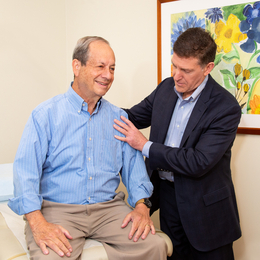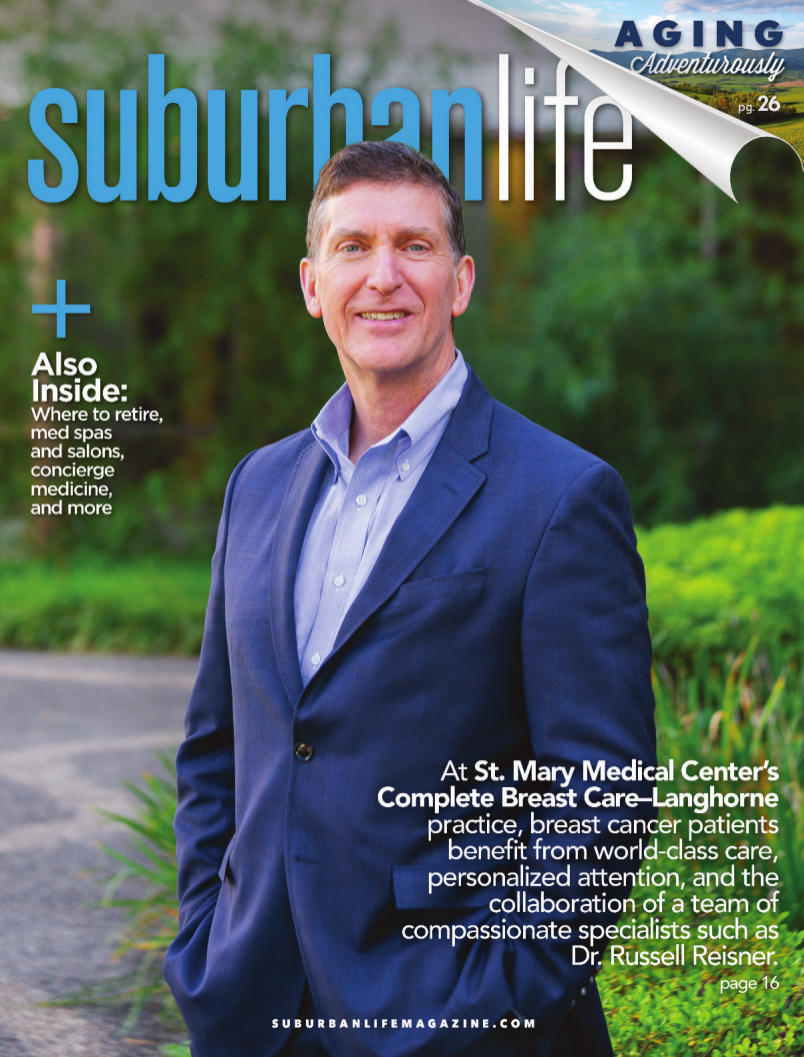
‘I Wasn’t Just a Number’
At St. Mary Medical Center’s Complete Breast Care – Langhorne practice, breast cancer patients like John Rosenthal benefit from world-class care, personalized attention, and the collaboration of a team of compassionate specialists.
Breast cancer is largely considered to be a woman’s issue, so it was the furthest thing from John Rosenthal’s mind in the summer of 2023, when a small lump on his chest led to his diagnosis. His friends and family members recommended heading to one of the well-known hospitals in Philadelphia for treatment, but the 78-year-old resident of Washington Crossing was confident he would find everything he’d need to beat the disease right in his own backyard.
Rosenthal received his initial diagnosis from Russell Reisner, M.D., a breast surgical oncologist with St. Mary Medical Center, and got a second opinion for peace of mind. He chose to return to St. Mary because he not only wanted world-class medical treatment, but also a team of providers who cared about him on a personal level.
“The doctors knew me there,” Rosenthal says. “Many years ago, my wife had breast cancer and she was having chemo treatment [elsewhere], and her doctor came in and had to look at her name tag to know who she was. My wife was not happy with that—she thought her doctors should know who she is—and I felt the same way. … We need a qualified doctor, and someone who cares about us and who knows us personally. That was the case in all situations at St. Mary, from the surgeon to the chemotherapy and the radiation doctors.”
Dr. Reisner appreciates the vote of confidence. For many years he has been listening to patients talk about how the attentiveness and compassion embodied by the entire St. Mary team deeply affected patients dealing with significant medical challenges.
“What I stress to our patients, because some of them do ask if there’s a benefit to going into the city, is that there is nothing that anyone could possibly need as far as treatment for breast cancer that they cannot get at St. Mary Medical Center,” Dr. Reisner says. “We have expert breast surgical oncologists and excellent reconstructive plastic surgeons, our medical oncologists and our radiation oncologists are top-notch, and everyone has been trained at fine institutions with state-of-the-art knowledge. … What they can get [here] without going to the city is a personalized level of care.”
The specialists at St. Mary, like Dr. Reisner, thrive on personal connections.
“Our patients want, expect, and quite honestly deserve a higher level of personal approach to their care,” he adds. “In my opinion, we can do that better in that regard than most institutions downtown.”
Dr. Reisner explains that although breast cancer is 100 times more common in women than men, he still has treated plenty of male patients over the years. The disease typically afflicts men in their 60s, 70s, or 80s, and the BRCA gene mutation associated with breast cancer is more common in individuals of Ashkenazi Jewish ancestry, like Rosenthal.
In addition to examining Rosenthal, Dr. Reisner sent his patient for a mammogram and ultrasound, followed by a needle biopsy to confirm and provide additional information about his cancer. He then recommended Rosenthal undergo a mastectomy.
“For men in general, the treatment surgical-wise for breast cancer is a bit more limited,” Dr. Reisner says. “Many women have the option of having either just the cancer removed in what has traditionally been called a lumpectomy, or nowadays is more often called a partial mastectomy, or they can have the whole breast removed if that’s the treatment they choose. We know, of course, that those two treatment options are identical as far as how well we can cure that woman of her breast cancer.
“For men,” he continues, “because we’re dealing with a much smaller amount of breast tissue in most cases, most men are not candidates for preserving their breast and removing just the tumor. They require the entire breast to be removed in a total mastectomy.”
Rosenthal’s treatment plan included chemotherapy and radiation after healing from surgery. He says he was pleased with the care he received at every step of his treatment.
“Dr. Reisner couldn’t have been more accommodating,” he says. “The appointments were always on time—it’s not like I had to sit in the lobby for an hour. He explained everything, and any questions I had, he handled properly. He couldn’t have been nicer through it all.”
All breast cancer patients at St. Mary are treated with a collaborative approach. It starts with a multidisciplinary conference where all of the different specialists can offer their unique insights to shape the treatment plan, and the coordination among departments results in a swifter delivery of care.
Rosenthal was fortunate to have no side effects from chemo or radiation. Today he is cancer-free and back to his normal routines of exercising regularly and playing golf. He considers himself lucky to have received world-class treatment 15 minutes from his home, at a hospital where it was easy to park his car by himself, and not have to wait for valet service. Of course, what he recalls most about the experience are the personal relationships he forged throughout the ordeal, like the time he ran into one of his doctors in the St. Mary cafeteria while buying a cup of coffee.
“He said, ‘Hi, John. Let me get that for you,’” Rosenthal recalls. “Not that it’s a big deal, but he didn’t have to do that. He saw me in the cafeteria, not in his office where he had his records, but he still knew me and he knew my name. It was nice to know that the doctors knew me well enough to care for me personally and I wasn’t just a number.”
The relationship is ongoing, as Rosenthal will continue to see Dr. Reisner for checkups every six months until he is cancer-free for five years. After that milestone, the appointments will occur on a yearly basis.
“He’s always had a great attitude about all of this,” Dr. Reisner says of his patient. “Luckily, he has good family support, good community support, and that is helpful for all of our patients. He asked appropriate questions about the benefits and risks of the different therapies that we have suggested for him, but he has been very positive in going forward with established therapies and coming for his follow-ups. We like to think we have offered him good support as well, like we do for all of our patients.”
St. Mary Medical Center
1201 Langhorne-Newtown Road
Langhorne, PA 19047
(215) 710-2000
trinityhealthma.org
1201 Langhorne-Newtown Road
Langhorne, PA 19047
(215) 710-2000
trinityhealthma.org
Photo by Alison Dunlap
Published (and copyrighted) in Suburban Life magazine, October 2024.



